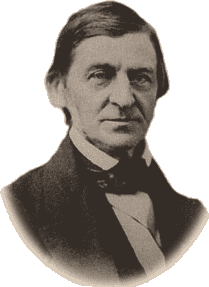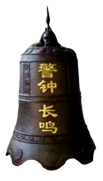Ralph Waldo Emerson (1803-1882)

Waldo Emerson is truly the center of the American transcendental movement, setting out most of its ideas and values in a little book, Nature, published in 1836, that represented at least ten years of intense study in philosophy, religion, and literature, and in his First Series of essays.
Born in 1803 to a conservative Unitarian minister, from a long line of ministers, and a quietly devout mother, Waldo--who dropped the "Ralph" in college--was a middle son of whom relatively little was expected. His father died when he was eight, the first of many premature deaths which would shape his life--all three brothers, his first wife at 20, and his older son at 5. Perhaps the most powerful personal influence on him for years was his intellectual, eccentric, and death-obsessed Puritanical aunt, Mary Moody Emerson. Yet Emerson often confessed to an innate optimism, even occasional "silliness."
His undergraduate career at Harvard was not illustrious, and his studies at the Harvard Divinity School were truncated by vision problems, but he was ordained a minister of the Second Church in Boston, shortly before marrying Ellen Tucker in 1829. He resigned in 1832 after her death from tuberculosis, troubled by theological doctrines such as the Lord's Supper, and traveled extensively in Europe, returning to begin a career of lecturing. In 1835 he married Lydia Jackson; they lived in Concord and had four children while he settled into his life of conversations, reading and writing, and lecturing, which furnished a comfortable income.
The Emerson house was a busy one, with friends like Elizabeth Hoar, Margaret Fuller, and Henry Thoreau staying for months to help out and talk. He, Bronson Alcott, and George Ripley decided to begin a magazine, The Dial, with Margaret Fuller editing, in 1840; Emerson would edit the final two years, ending in 1844, and he wrote essays for many issues. His Essays (first series) were published in 1841.
Meanwhile, tragedy struck with the sudden death of his five-year old son Waldo in 1842, soon after the death of John Thoreau from lockjaw, and a darker, tougher strain appears in Emerson's writing, beginning with his memorializing poem, "Threnody." But Emerson pulled himself together to give a series of lectures in New York and in 1844 he had a new volume of essays prepared. He began planning a series of lectures on great men and publication of his poems in 1846, while speaking out against the annexation of Texas and reading deeply in texts of Persian and Indic wisdom.
In 1845 he began extensive lecturing on "the uses of great men," a series that culminated with the 1850 publication of Representative Men; by that year he was giving as many as 80 lectures a year. Through a career of 40 years, he gave about 1500 public lectures, traveling as far as California and Canada but generally staying in Massachusetts. His audiences were captivated by his speaking style, even if they didn't always follow the subtleties of his arguments.
In 1847 Emerson travelled to England, noticing in particular the industrialization and the chasm between upper and lower classes. When he returned to Concord nine months later, he had a new approach to English culture, which he expressed in his lectures on the "Natural History of Intellect" and his 1856 book, English Traits.
In 1851 he began a series of lecture which would become The Conduct of Life, published in 1860. He was vigorous in middle age, traveling frequently, but was increasingly aware of his limits and failing energy. He had become quite famous, a major figure in the American literary landscape, a celebrity which brought both adultation and satire. He had been a profound inspiration for many writers, especially Henry Thoreau and Walt Whitman. He continued his speeches against slavery, but never with the fire of Theodore Parker. In 1857 he wrote an essay on "Memory" but ironically, in his later years, his own memory would falter, especially after his beloved house burned in 1872. He died quietly of pneumonia in 1882.
The Apology
By Ralph Waldo Emerson
Think me not unkind and rude,
That I walk alone in grove and glen;
I go to the god of the wood
To fetch his word to men.
Tax not my sloth that I
Fold my arms beside the brook;
Each cloud that floated in the sky
Writes a letter in my book.
Chide me not, laborious band,
For the idle flowers I brought;
Every aster in my hand
Goes home loaded with a thought.
There was never mystery,
But 'tis figured in the flowers,
Was never secret history,
But birds tell it in the bowers.
One harvest from thy field
Homeward brought the oxen strong;
A second crop thine acres yield,
Which I gather in a song.
|
The Amulet
By Ralph Waldo Emerson
Your picture smiles as first it smiled,
The ring you gave is still the same,
Your letter tells, O changing child,
No tidings since it came.
Give me an amulet
That keeps intelligence with you,
Red when you love, and rosier red,
And when you love not, pale and blue.
Alas, that neither bonds nor vows
Can certify possession;
Torments me still the fear that love
Died in its last expression
|
Days
By Ralph Waldo Emerson |
|
| DAUGHTERS of Time, the hypocritic Days, |
|
| Muffled and dumb like barefoot dervishes, |
|
| And marching single in an endless file, |
|
| Bring diadems and fagots in their hands. |
|
| To each they offer gifts after his will, |
|
| Bread, kingdoms, stars, and sky that holds them all. |
|
| I, in my pleachèd garden, watched the pomp, |
|
| Forgot my morning wishes, hastily |
|
| Took a few herbs and apples, and the Day |
|
| Turned and departed silent. I, too late, |
|
| Under her solemn fillet saw the scorn. |
|
| Worship |
| By Ralph Waldo Emerson |
|
| THIS is he, who, felled by foes, |
|
| Sprung harmless up, refreshed by blows |
|
| He to captivity was sold, |
|
| But him no prison-bars would hold: |
|
| Though they sealed him in a rock, |
|
| Mountain chains he can unlock: |
|
| Thrown to lions for their meat, |
|
| The crouching lion kissed his feet: |
|
| Bound to the stake, no flames appalled, |
|
| But arched o’er him an honouring vault. |
|
| This is he men miscall Fate, |
|
| Threading dark ways, arriving late, |
|
| But ever coming in time to crown |
|
| The truth, and hurl wrong-doers down. |
|
| He is the oldest, and best known, |
|
| More near than aught thou call’st thy own, |
|
| Yet, greeted in another’s eyes, |
|
| Disconcerts with glad surprise. |
|
| This is Jove, who, deaf to prayers, |
|
| Floods with blessings unawares. |
|
| Draw, if thou canst, the mystic line |
|
| Severing rightly his from thine, |
|
| Which is human, which divine. |
   
|
|




